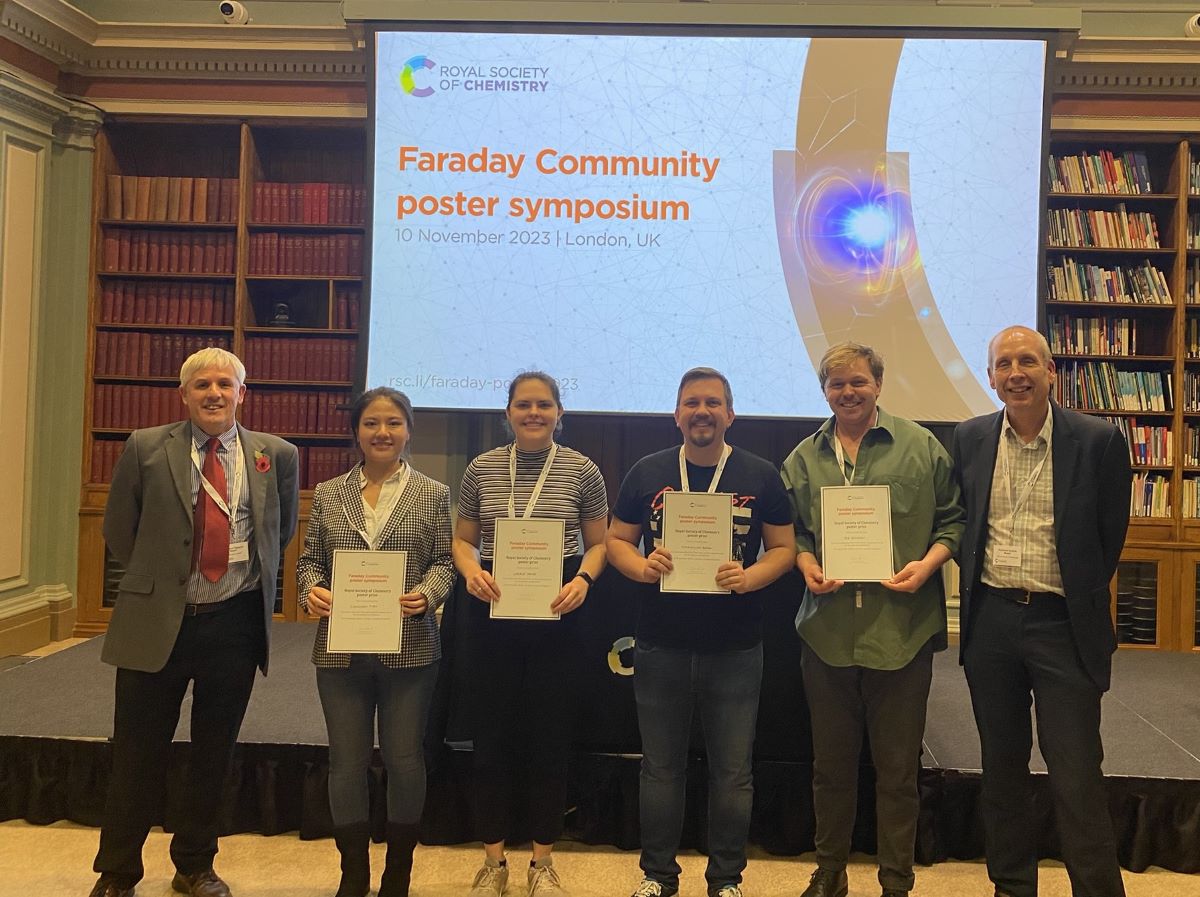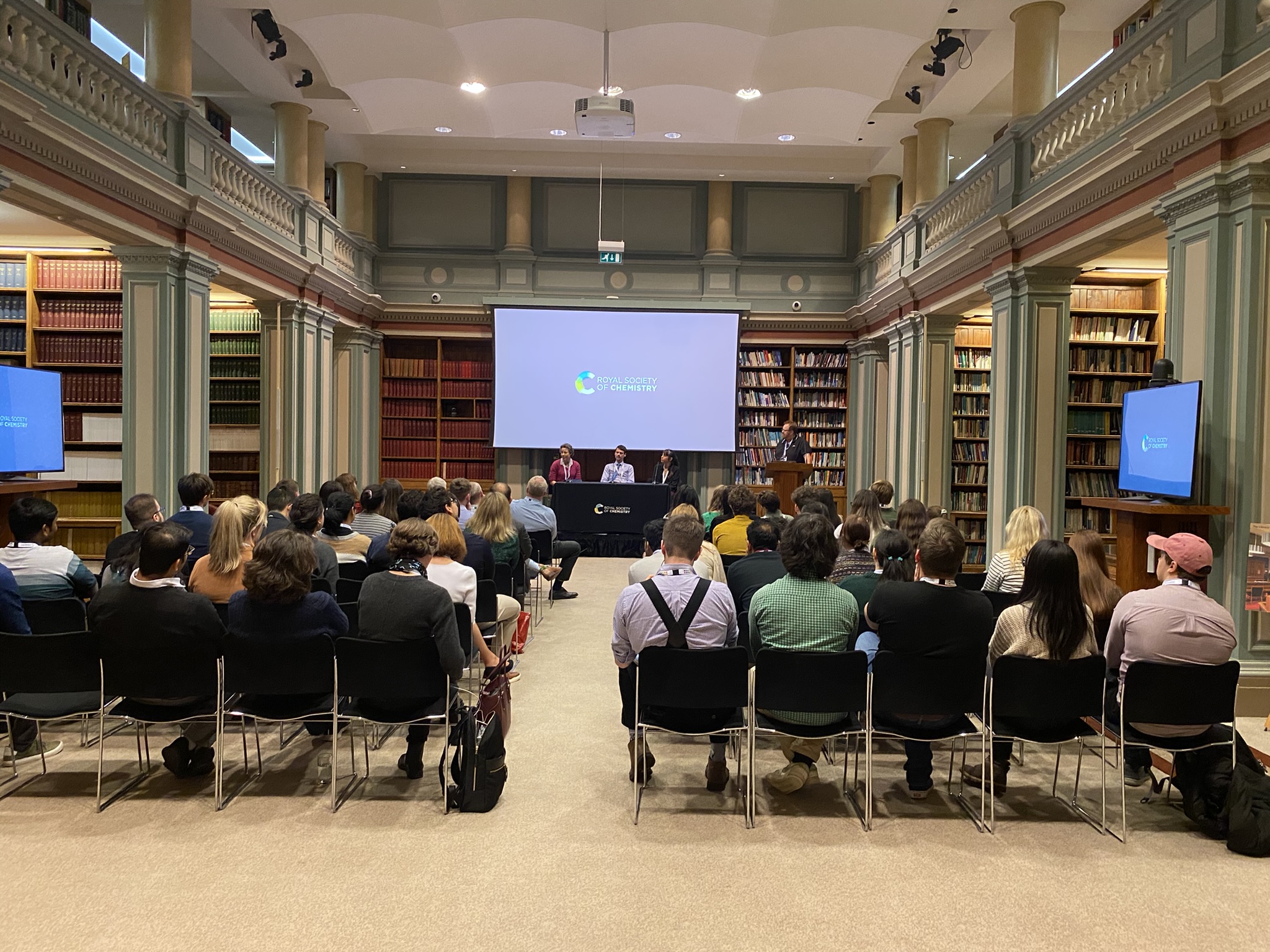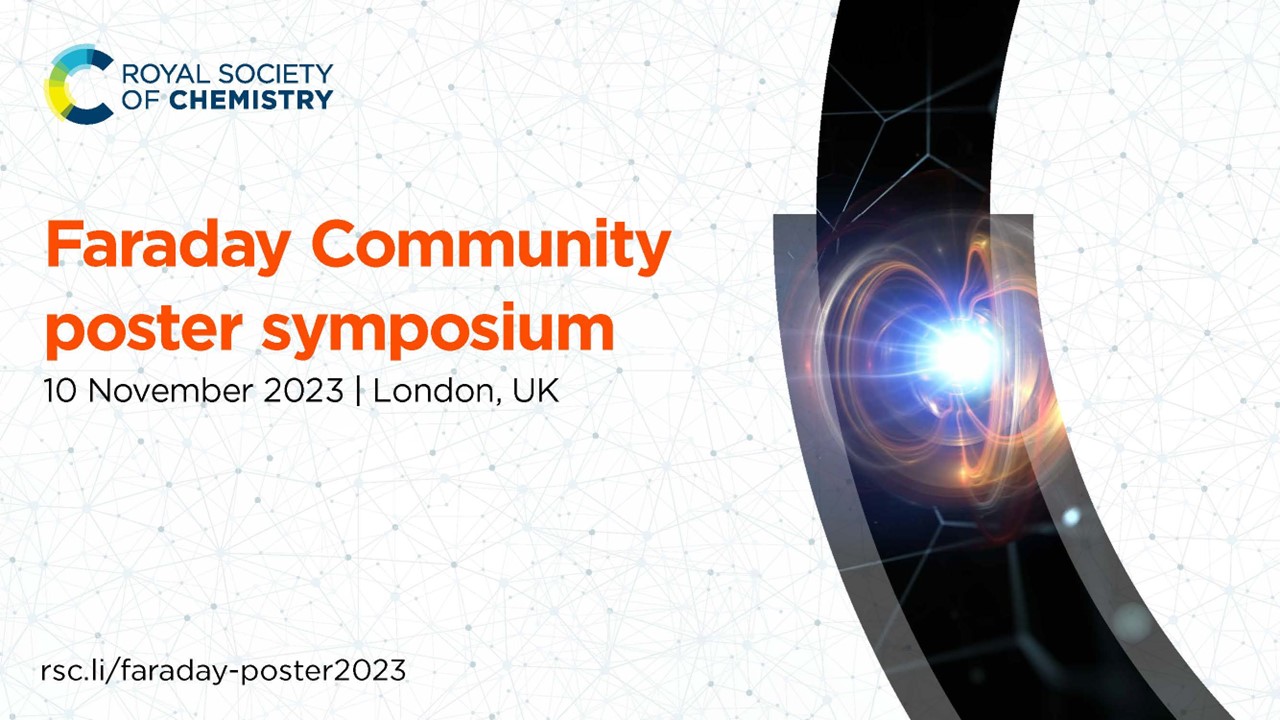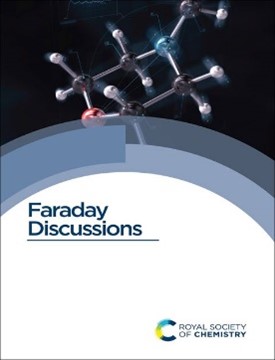Faraday Community Poster Symposium 2023
On 10 November 2023, the UUÂãÁÄÖ±²¥ of Chemistry’s Burlington House, London, hosted the first Faraday Community Poster Symposium, celebrating the ground-breaking research being undertaken across physical chemistry. The event brought together PhD students, Post-doctoral researchers and early career researchers in industry.
The day started with networking and an introduction from Faraday Community President, Dwyane Heard, followed by 1 minute flash presentations, allowing attendees to provide a short “elevator pitch” for their poster. There was then ample opportunity for discussions, networking and poster presentations during the morning and afternoon sessions. The day ended with a career panel discussion with invited speakers from industry and academia to share their experiences and answer questions from the delegates on their career path and decisions.
There were 43 posters presented from the breadth of physical chemistry, from techniques to identify synthetic diamonds to tackling antimicrobial resistance through modelling to improving models using existing density functional theory. The judges praised the superb quality and the breath of physical chemistry on show from the poster presenters and the outstanding conversation during the day.
The breadth of physical chemistry and its applications on display made this event unique in the event calendar, providing opportunities for discussions and ideas sharing across the subject.
This was the first ever Faraday Poster Symposium we had run, and it really did exceed expectations. We had around 50 early career researchers, primarily PhD students, from across the whole breadth of Physical Chemistry. What really struck me was not only the broad range of topics represented at the meeting, but the genuine enthusiasm of the researchers as they presented their posters – what passion they had about their science! For many, it was the first time in Burlington House, and the first time presenting to a large audience from across the discipline. Having a whole day for the posters rather than just a couple of hours squeezed in at the end of a long conference programme meant there was plenty of time both for science and networking throughout the day. I spoke to some fo the students during the refreshments at the end of the day and the careers panel involving scientists from both academia and industry had been particularly informative and useful to them as they considered their future.
All members of my group that attended—including me—found it to be a really worthwhile and rewarding endeavour
Congratulations to our Prize Winners!
I would like to congratulate the winners of the four poster prizes which I presented towards the end of the Symposium. These included the Pariticipation Prize, which was voted by the delegates, and 3 prizes (2 for PhD students and one for postdocs) judged by a small panel of experts from academia and industry. Decisions on the winners were extremely difficult as the quality of all the posters and the short flash presentation was very high. Once again, what came over very clearly was the enthusiam and passion of the presenters, demonstrating that the future of Physical Chemistry in the UK is in very good hands indeed!
The winners below scored the highest amongst our judges and receive cash prizes:
Best post-doctoral poster
Maksymilian Roman, University of Liverpool
Best PhD poster
Lorrie Jacob, University of Cambridge
Runner-up PhD poster
Seb Jackson, Heriot-Watt University

Participants prize
Congratulations to our participants prize winner, voted for by attendees at the Poster Symposium:
Jianghan Tian, University of Bristol
Jianghan received a book token, worth roughly £200, sponsored by the UUÂãÁÄÖ±²¥ Journals Physical Chemistry Chemical Physics and Faraday Discussions.
Hear direct from our prize winners and find out what they are doing next.
Supporting the careers of Early Career Researchers
Throughout the day delegates had the opportunity to book a one-to-one career consultation with UUÂãÁÄÖ±²¥ Career & Professional Development Adviser, Robert Bowles, to support their career development and get specialised support for CVs, job hunting and next steps. Students enthusiastically embraced the opportunity, with all career consultation slots booked before the day began.
During the afternoon session, the event included a Career Panel discussion, where invited speakers from across physical chemistry provided insight into their career development, and students could ask questions of the panel. There were engaging discussions on learning from failure, differences and similarities between academia and industry and perceptions of job roles across physical chemistry.
It was a pleasure to be part of the event and I am delighted that it was a success

With special thanks to...
We would like to gratefully thank the sponsors of the Participation Prize; the UUÂãÁÄÖ±²¥ Journals Physical Chemistry Chemical Physics and Faraday Discussions.
We would also like to thank the Careers Panellists: Prof. Claire Vallance (University of Oxford, Faraday Division Past President), Dr Lauren Hatcher (Cardiff University) and Dr. Paul Brewer (NPL).
We are grateful to this year’s poster judges:
- Prof. Andrew Mount (FCPC President-Elect)
- Prof. Alice Thorneywork
- Prof. Helen Fielding
- Prof. Elena Besley (FCPC council member)
- Dr Cristina Trujillo
- Dr Simon Port (FCPC Council member and Industrial Physical
- Chemistry Interest Group representative)
Finally, many thanks to the organising committee: Professor Dwayne Heard, Professor Elena Besley, Professor Brianna Heazlewood, Dr Marco Sacchi and Dr Cristina Trujillo.
For additional information on this event, future iterations, or how to sponsor this event, please contact the Science Communities Team.
Our thanks to sponsors of the event, UUÂãÁÄÖ±²¥ Industrial Physical Chemistry Group (IPCG).



